Software Supply Chain Security: A Detailed Explanation
Software supply chain attacks cost businesses $45.8 billion globally in 2023 alone, and is projected...
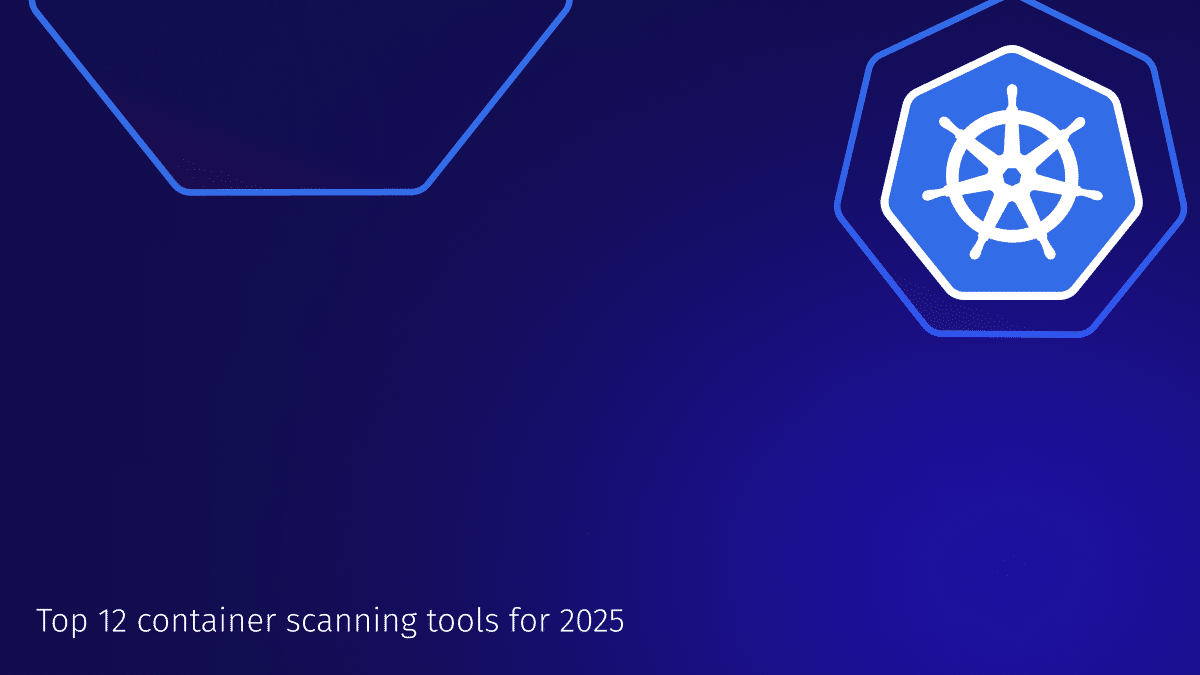
Jan 5, 2025
Kubernetes is a revolutionary technology for orchestrating containerized applications, enabling organizations to deploy and manage applications efficiently. Containers’ portability, scalability, and agility have transformed software development and deployment.
However, these benefits come with significant security challenges, including risks associated with vulnerabilities in container images and potential misconfigurations. To address these challenges, container scanning tools have become essential container security solutions that help identify and mitigate potential threats in both container images and running containers.
When evaluating container scanning tools, it’s essential to look for specific features that align with your organizational needs:
This guide provides an overview for choosing the best container security software. When evaluating container security tools for real-world usage, several key criteria should be considered to ensure the selected solution meets organizational requirements:
These selection criteria help organizations effectively evaluate container security tools and make informed decisions that align with their specific security needs.
ARMO Platform stands out as a comprehensive Kubernetes security solution designed to enhance the security posture of containerized environments.
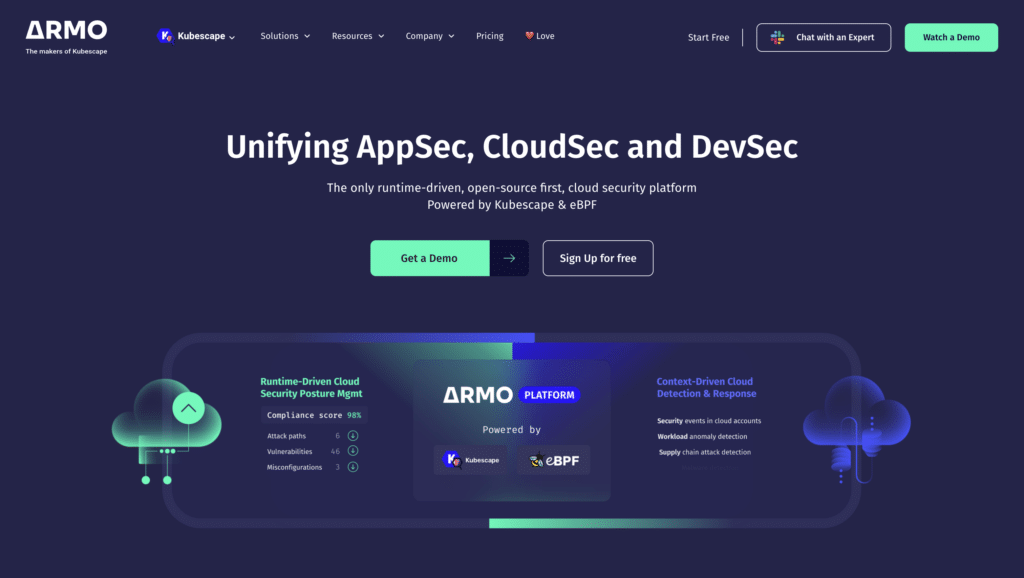
Main Features:
Best For: ARMO platform is ideal for medium to large-scale Kubernetes environments that require image vulnerability scanning tools and robust compliance monitoring.
Pricing Model: Paid
Verdict: ARMO platform offers a robust set of features to ensure compliance and enhance security in Kubernetes environments, making it suitable for organizations with significant containerized workloads.
Anchore is a leading platform that provides container security scanning tools specifically designed for cloud-native workloads. This ensures that organizations can deploy secure applications in their environments.
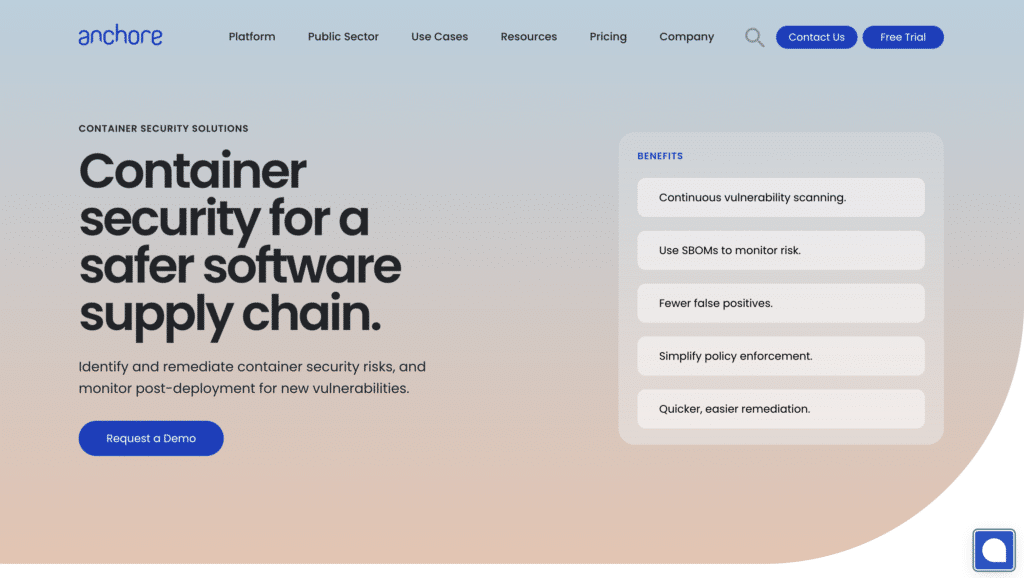
Main Features:
Best For: Anchore is well-suited for organizations looking to integrate OCI-compliant image scanning or Docker image vulnerability scanning tools into their CI/CD pipelines, enhancing security throughout the development lifecycle.
Pricing Model: Paid
Verdict: Anchore provides robust features for securing cloud-native workloads, making it an excellent choice for organizations aiming to enhance their CI/CD processes with effective vulnerability scanning and policy enforcement.
Aqua Security offers a suite of container security scanning tools, providing organizations with the necessary resources to secure their containerized applications from development through deployment.
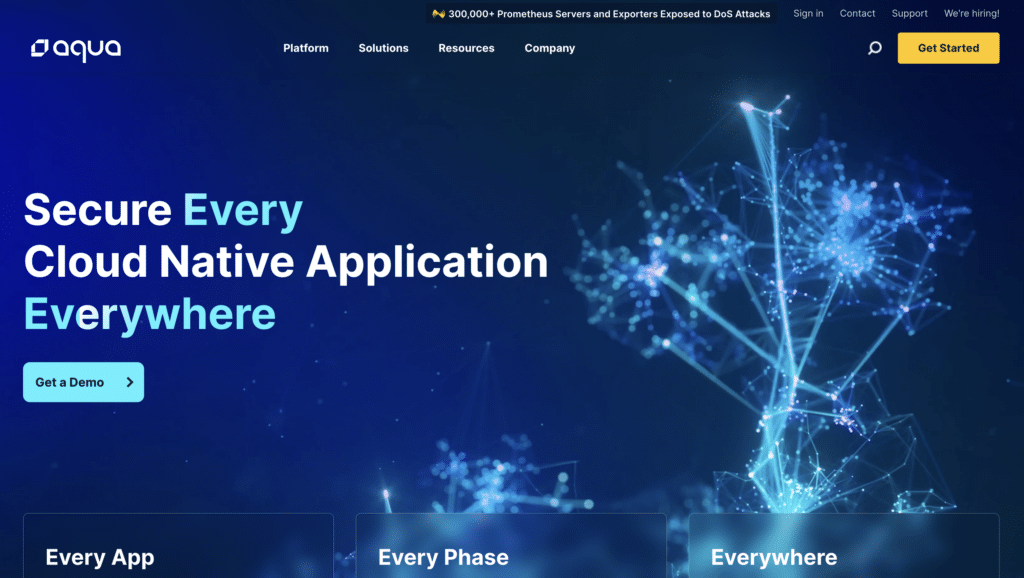
Main Features:
Best For: Aqua Security is ideal for organizations that require end-to-end container and cloud-native application security. It offers robust vulnerability management, compliance enforcement, and runtime protection across diverse environments, including public and private registries.
Pricing Model: Paid
Verdict: Aqua Security provides a comprehensive suite of tools for managing vulnerabilities throughout the container lifecycle, making it an excellent choice for organizations focused on maintaining robust application security.
Check Point CloudGuard Container Security provides advanced container security solutions specifically designed to protect sensitive data within containerized environments.
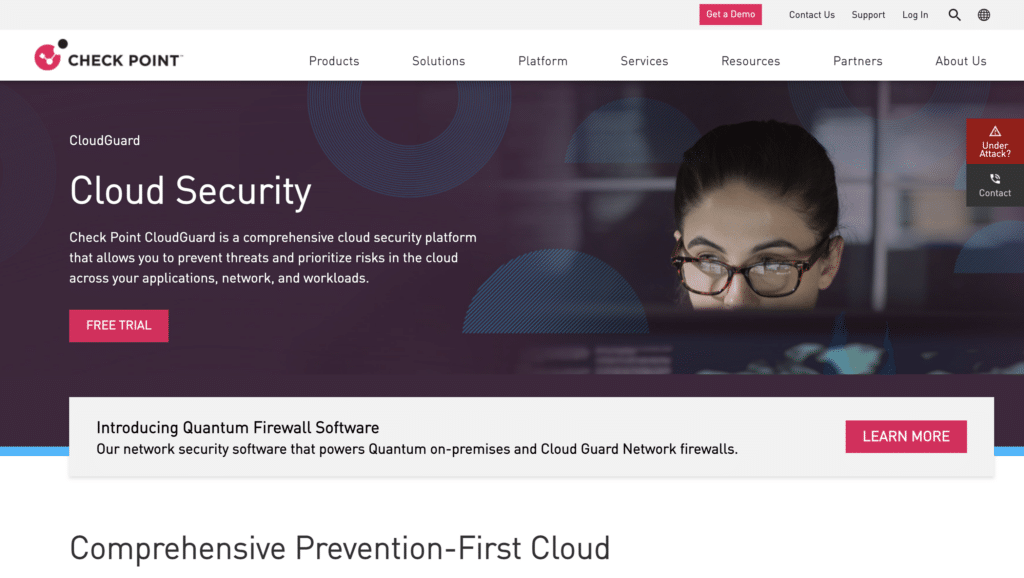
Main Features:
Best For: Check Point CloudGuard Container Security is ideal for enterprises needing a scalable, policy-driven solution to secure containerized applications and manage vulnerabilities across registries and runtime environments.
Pricing Model: Paid
Verdict: Check Point CloudGuard Container Security offers a comprehensive suite of features to protect sensitive data and maintain security in containerized environments, making it a strong choice for enterprises with significant security needs.
Snyk Container is a developer-focused tool that integrates seamlessly into CI/CD pipelines. It provides comprehensive container security scanning and contextualized vulnerability management for Kubernetes and containerized applications.
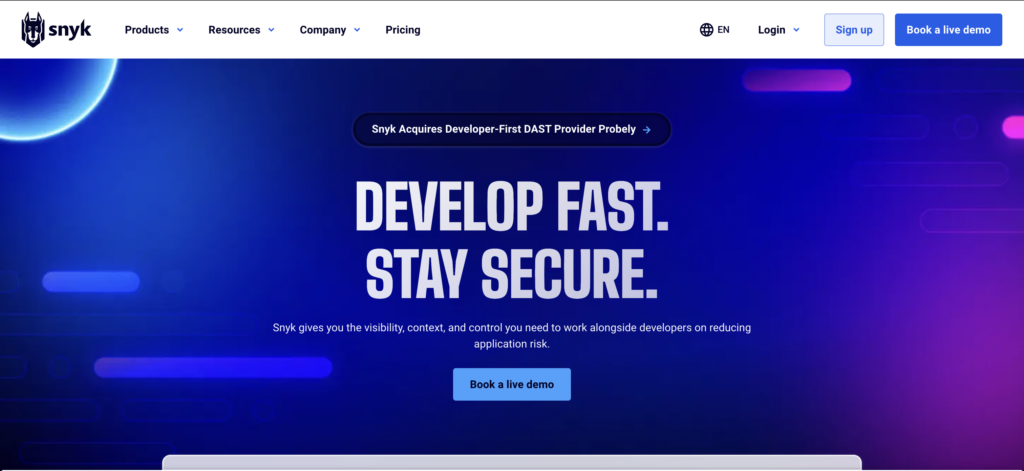
Main Features:
Best For: Organizations that prioritize developer-first approaches to security and want to embed container security tools into their software development lifecycle. Ideal for teams working with Docker Hub and Kubernetes in fast-paced DevOps environments.
Pricing Model: Paid
Verdict: Snyk Container is a robust container security solution for Docker and Kubernetes environments. Its deep CI/CD integration and focus on developer usability make it a strong contender for teams seeking to enhance security without disrupting workflows. The product’s ability to contextualize potential threats within Kubernetes environments ensures efficient prioritization and remediation, aligning security policies with operational efficiency.
Skyhawk Security combines AI-driven threat detection with container security scanning tools as part of its unified cloud security platform. It delivers advanced runtime visibility and static analysis to identify and mitigate vulnerabilities in container images.
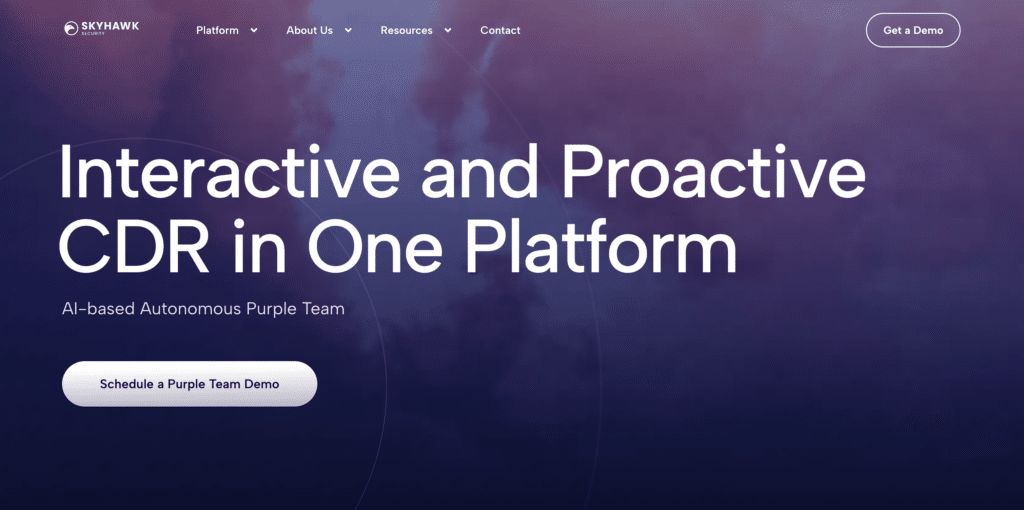
Main Features:
Best For: Enterprises with complex cloud environments seeking comprehensive visibility into runtime vulnerabilities in container images. Ideal for organizations prioritizing advanced threat detection and remediation across containerized applications and multi-cloud infrastructures.
Pricing Model: Paid
Verdict: Skyhawk Security excels at offering a unified solution for cloud security posture challenges, integrating advanced AI-driven threat detection with runtime visibility. Its image vulnerability scanning tools enhance its appeal for Docker and Kubernetes environments, while its focus on real-time analysis positions it as a strong choice for organizations dealing with dynamic security policies and multi-cloud ecosystems.
Fortinet offers a Cloud-Native Application Protection Platform (CNAPP) that integrates container security software with multi-cloud workload protection and risk prioritization.
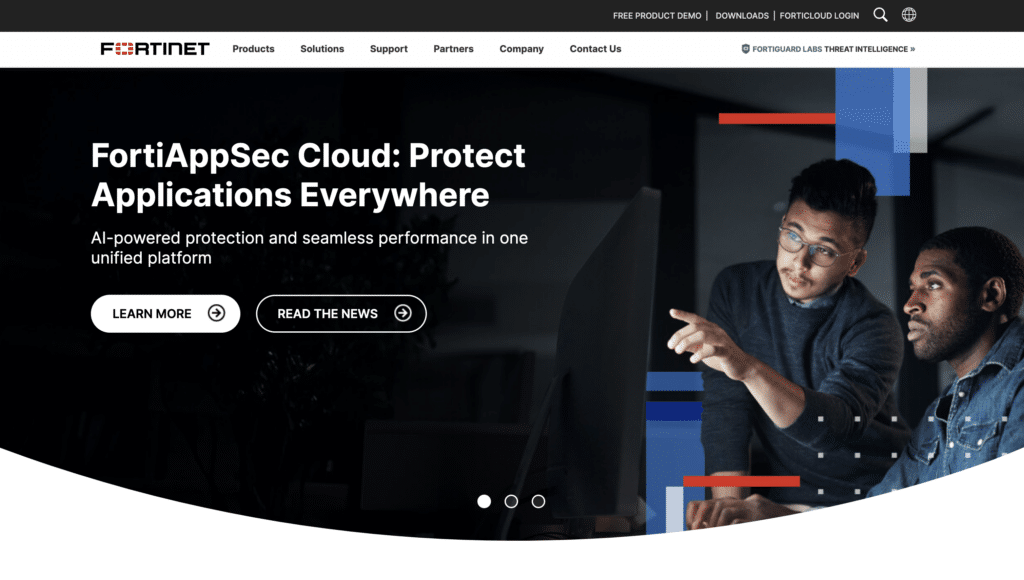
Main Features:
Best For: Organizations looking for container image scanners that integrate seamlessly into hybrid and multi-cloud environments. It is particularly suited for businesses needing scalable protection for Docker workloads alongside traditional cloud infrastructures.
Pricing Model: Paid
Verdict: Fortinet provides a versatile container scanning tool for securing cloud-native applications. Its CNAPP approach ensures comprehensive protection by combining workload, network, and image security into a cohesive platform. With its focus on dependencies and risk prioritization, Fortinet is well-positioned to support enterprises aiming to safeguard containerized applications while managing container registries efficiently.
Qualys delivers a robust container security and compliance platform, integrating image CVE scanning, runtime protection, and static analysis of container registries.
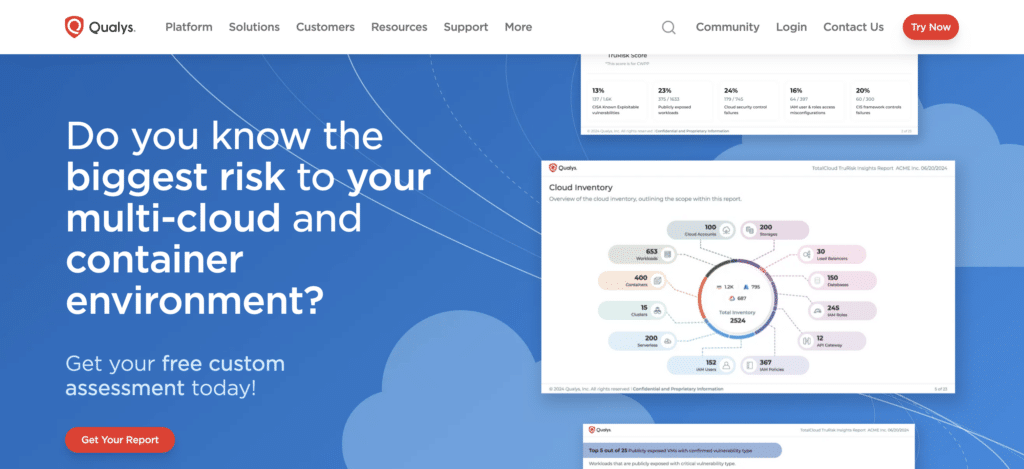
Main Features:
Best For: Enterprises focused on Docker image vulnerability scanning tools and compliance, especially those needing an all-in-one container scanning solution to manage vulnerabilities, enforce compliance, and maintain runtime protection.
Pricing Model: Paid
Verdict: Qualys delivers a robust platform for image vulnerability scanning tools, balancing vulnerability management with runtime protection. Its focus on compliance and the ability to work with open-source tools like Anchore Engine make it an excellent choice for organizations needing to adhere to strict regulatory requirements. With a strong reputation in the cybersecurity industry, Qualys is a reliable resource for securing Docker images and managing their container registries effectively.
Root is an optimized container image scanner designed to enhance the efficiency of software supply chains by focusing on security and performance.
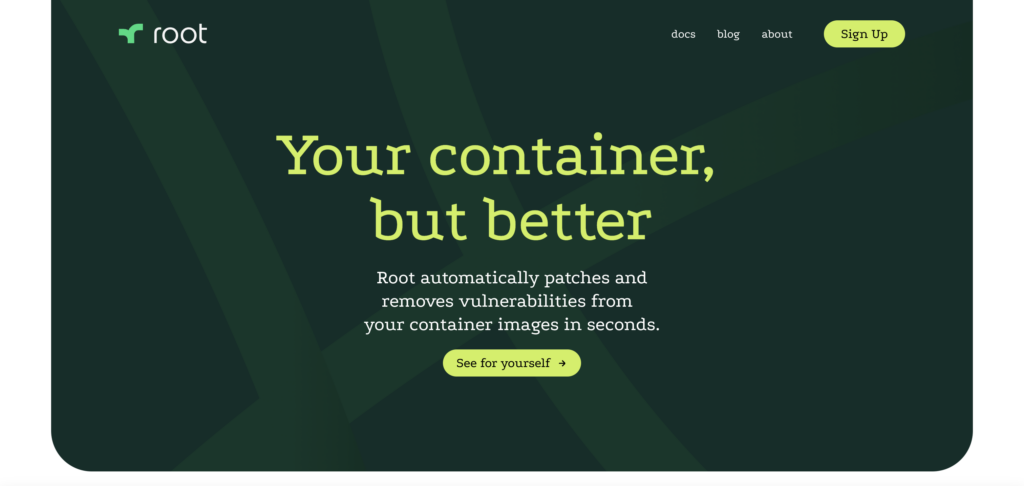
Main Features:
Best For: Root is particularly suited for organizations looking to enhance performance while streamlining DevSecOps workflows, making it an excellent choice for those focused on efficiency and security.
Pricing Model: Paid
Verdict: Root delivers a powerful solution for optimizing container images and automating vulnerability remediation, making it a valuable asset for organizations aiming to improve their software development security.
Tenable is a unified container security software solution designed to manage container vulnerabilities across various environments effectively.
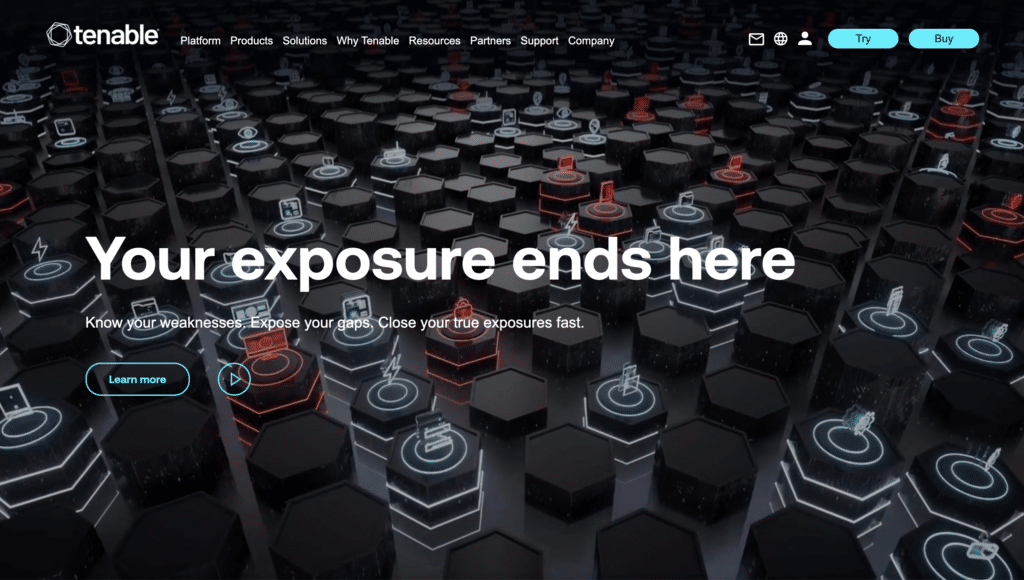
Main Features:
Best For: While Tenable doesn’t offer specialized tools exclusively for container image scanning, its Nessus Cloud and Tenable.io platforms provide robust vulnerability management capabilities tailored to container environments.
Pricing Model: Paid
Verdict: Tenable offers a robust platform for managing container vulnerabilities, providing essential features for scanning, analysis, and risk prioritization, making it a strong option for businesses seeking to enhance their container security practices.
Rapid7 Exposure Command is a specialized tool focused on reducing third-party risk in containerized applications, ensuring organizations can maintain a secure software supply chain.
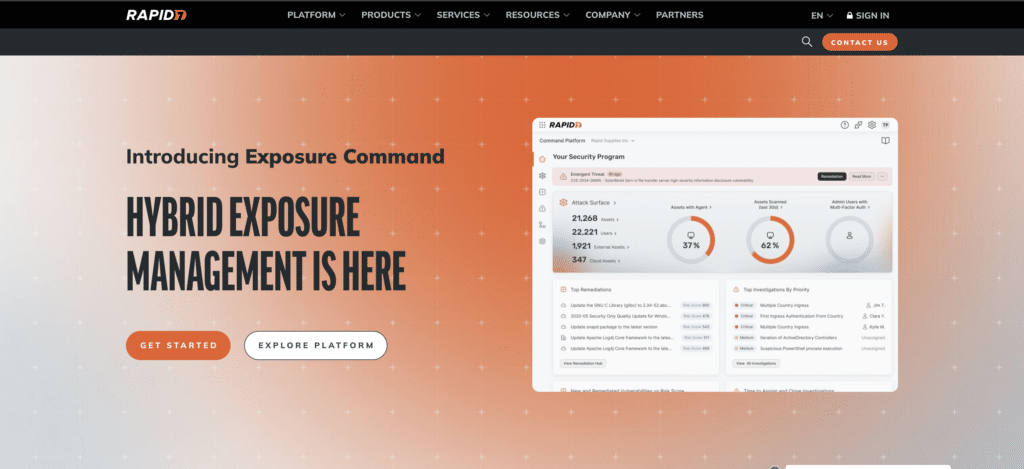
Main Features:
Best For: Rapid7 Exposure Command is particularly well-suited for enterprises aiming to secure their supply chains by mitigating potential threats in container ecosystems, making it an essential tool for organizations that rely on third-party components.
Pricing Model: Paid
Verdict: Rapid7 Exposure Command offers targeted features for monitoring and analyzing vulnerabilities in containerized applications, making it a valuable asset for enterprises focused on enhancing their security posture and managing third-party risks.
Palo Alto Prisma Cloud is a comprehensive container security software solution designed to protect multi-cloud workloads, providing organizations with a robust security framework.
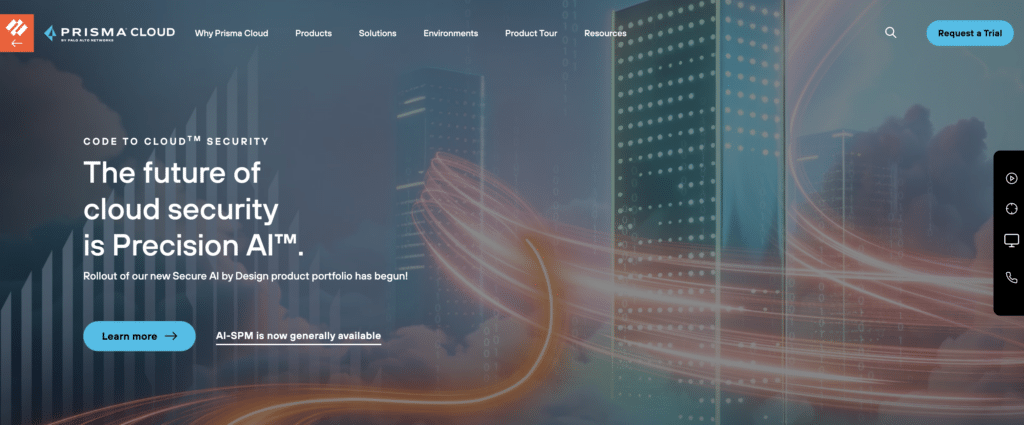
Main Features:
Best For: Prisma Cloud is particularly well-suited for enterprises requiring all-in-one container security solutions to protect their multi-cloud environments, making it an ideal choice for organizations with complex deployment needs.
Pricing Model: Paid
Verdict: Palo Alto Prisma Cloud delivers a comprehensive suite of features for securing multi-cloud workloads, making it a strong option for enterprises looking to enhance their container security across diverse environments.
| Tool | Best For | Pricing Model | Verdict |
|---|---|---|---|
| ARMO Platform | Medium to large-scale Kubernetes environments | Paid | Robust features for compliance and security in Kubernetes environments |
| Anchore | OCI-compliant image scanning in CI/CD pipelines | Paid | Enhances CI/CD processes with vulnerability scanning and policy enforcement |
| Aqua Security | End-to-end container and cloud-native application security | Paid | Comprehensive tools for managing vulnerabilities throughout the container lifecycle |
| Check Point CloudGuard | Enterprises needing scalable, policy-driven solutions | Paid | Comprehensive features for protecting sensitive data in containerized environments |
| Snyk Container | Developer-first security in CI/CD pipelines | Paid | Deep CI/CD integration and focus on developer usability |
| Skyhawk Security | Enterprises with complex cloud environments | Paid | Unified solution with AI-driven threat detection and runtime visibility |
| Fortinet | Hybrid and multi-cloud environments | Paid | Versatile tool combining workload, network, and image security |
| Qualys | Docker image vulnerability scanning and compliance | Paid | Balances vulnerability management with runtime protection |
| Root | Enhancing performance and streamlining DevSecOps workflows | Paid | Optimizes container images and automates vulnerability remediation |
| Tenable | Managing container vulnerabilities | Paid | Robust platform for scanning, analysis, and risk prioritization |
| Rapid7 Exposure Command | Securing supply chains in container ecosystems | Paid | Targeted features for monitoring and analyzing vulnerabilities |
| Palo Alto Prisma Cloud | All-in-one container security for multi-cloud environments | Paid | Comprehensive features for securing multi-cloud workloads |
These container security tools offer numerous features and benefits tailored to different organizational needs. Solutions like ARMO Platform‘s smart policy engine, Anchore’s customizable rules, and Aqua Security’s comprehensive lifecycle scanning address critical aspects of container security, including vulnerability management, compliance, and runtime protection.
ARMO Platform secures Kubernetes by providing a unified platform that ensures compliance, identifies vulnerabilities, and enforces runtime security policies. With its robust policy engine and automated risk assessment tools, ARMO proactively protects containerized applications throughout their lifecycle.
Secure your Kubernetes environment today: start your free trial of the ARMO Platform now.

The only runtime-driven, open-source first, cloud security platform:
Continuously minimizes cloud attack surface
Secures your registries, clusters and images
Protects your on-prem and cloud workloads
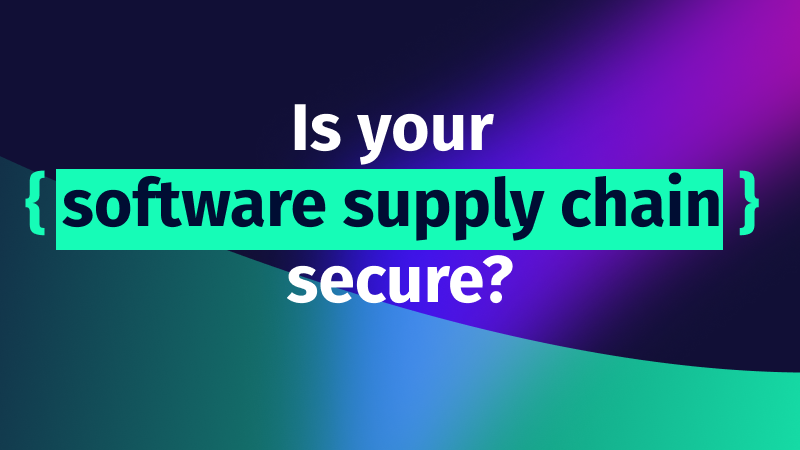
Software supply chain attacks cost businesses $45.8 billion globally in 2023 alone, and is projected...
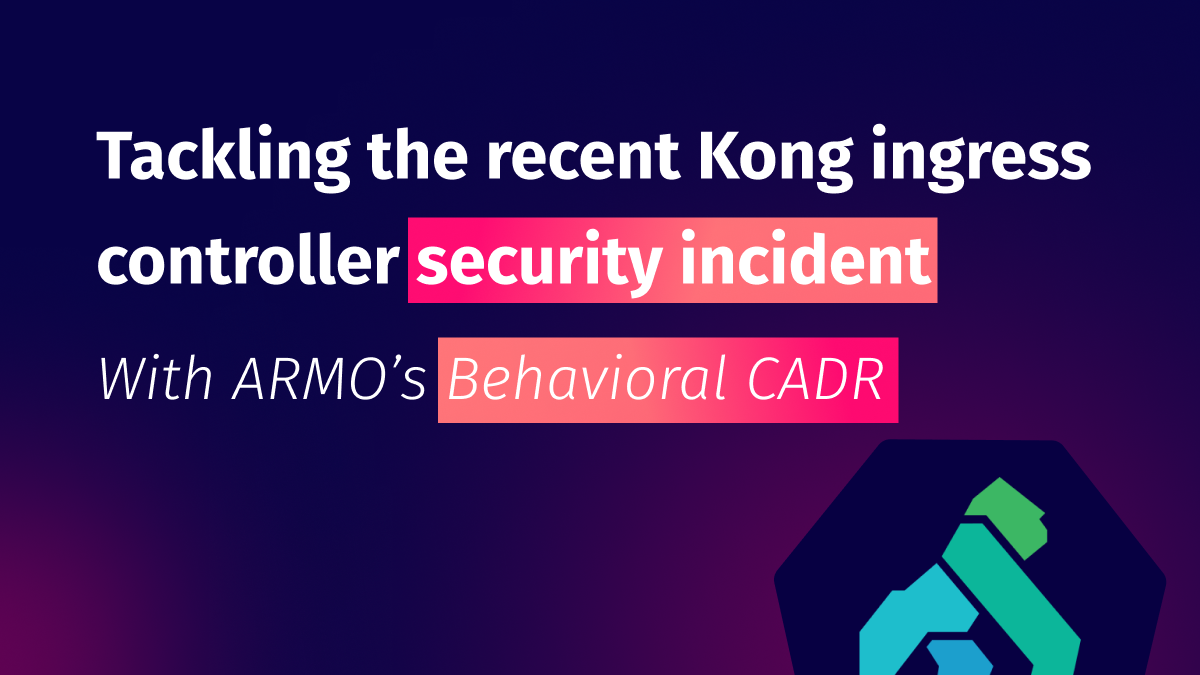
Imagine this situation: you recently updated one of your infrastructure software components. A few weeks...
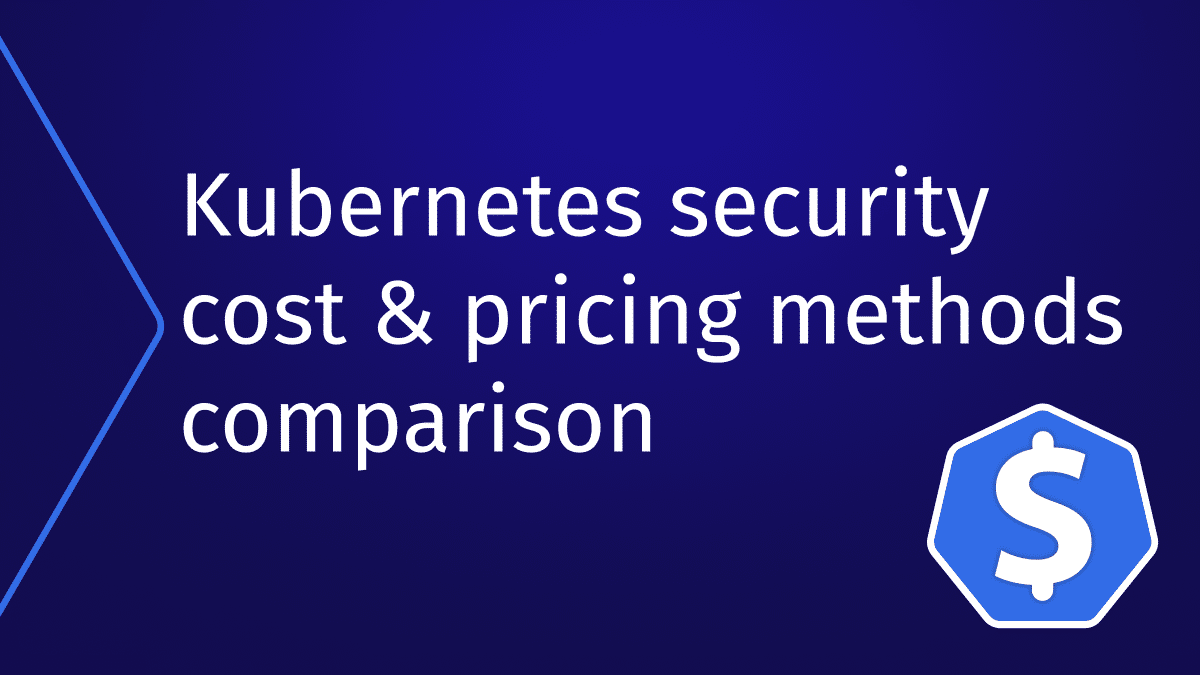
It is becoming increasingly important for organizations to manage Kubernetes security costs as they deploy,...